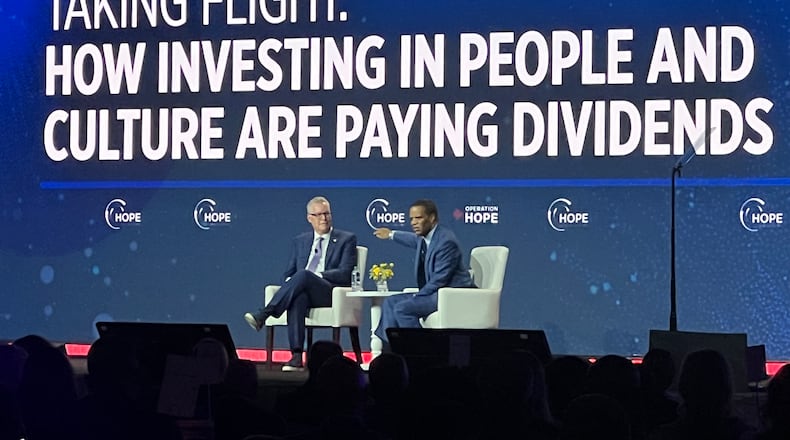Delta Air Lines flight attendant Loretta Day has dreams of buying a house one day, but she found herself racking up credit card debt while treating herself to Bath & Body Works candles and dining out on trips.
An email she got from her employer offered up to $1,000 for an emergency savings fund if she completed a financial education program for employees.
She laughed. “I’m like, yeah, Delta is gonna give me $1,000,” she said. Then a couple of days later, “I went back and read it again and said, ‘You know what? I’ll do it.’”
Many employers offer financial literacy programs to their workers as an employee benefit, including Atlanta-based Delta. But during the COVID-19 pandemic, Delta cut hours, offered early retirement and took other steps to ensure survival as travel ground to a halt. Delta executives noticed workers were pulling funds from their retirement savings to make ends meet.
This year, Delta launched an expansion of its employee financial well-being courses with longtime nonprofit partner Operation HOPE.
Employees can sign up, watch financial education videos and get financial coaching sessions with Fidelity Investments — and get $750 from Delta deposited into a Fidelity savings account.
Employees who sign up for payroll deductions and put $250 of their own money into their account then get an additional $250 match from Delta.
Day is one of more than 33,000 Delta employees who signed up for the emergency savings fund program the company began offering its employees this year.
About 57% of U.S. adults can’t afford a $1,000 emergency expense, according to Bankrate.com in a report this year.
Of Delta’s 100,000 employees, more than 21,000 have completed the program — most of them frontline hourly employees such as flight attendants and airport workers, according to Kelley Elliott, Delta’s vice president of Total Rewards, who runs human resources for the company. That amounts to about $21 million in Delta contributions.
Day, 51, was featured Monday during a panel discussion between Delta officials and Operation HOPE CEO John Hope Bryant during the financial literacy nonprofit’s annual summit in downtown Atlanta.
Day said she learned during the financial education sessions that “pretty much everything that I was doing was okay. But it wasn’t preparing me for retirement, or leaving an inheritance for my kids,” who are in their early 30s, Day said.
During one of the sessions, her financial coach suggested she consider cutting expenditures on dining out and candle purchases. She gave it a try for a month.
“I could not believe the amount of money that was still in my account” — $700 in one month, she said.
Her daughter recently called and asked for help paying her rent. “And I said, ‘Well how much do you need?” Day said. “While we were still on the phone, I was able to send her” the $850 she needed — something Day says wouldn’t have been possible before she started saving this year.
Day now aims to save enough for a down payment on a house next year. “That’s my goal. I want to leave something for my kids, my grandkids. ... How can I buy a house if I’m buying all these candles?”
She also learned from the financial education sessions that she was leaving money on the table by not contributing more to her 401(k).
Nearly 40% of HR professionals who responded to a survey said their companies offer financial education or counseling to employees, and 20% offer one-on-one financial coaching, according to an HR Research Institute report this year.
During the pandemic more than 40,000 of Delta employees took unpaid leave.
The company’s executives noticed that employees were taking money from their 401(k) funds, collectively pulling out about $1 billion in early withdrawals. That indicated that they were struggling and needed help.
While the airline has paid out more than $1 billion in profit sharing to employees in past years and plans to again for this year’s results, its fortunes plummeted early in the pandemic and profit sharing payments were cut while employee hours and pay were reduced.
Employees who are worried about money “can’t show up to be the best that they can be that day, because they’re stressed out about something else,” Delta CEO Ed Bastian said during Monday’s event.
Struggling financially “corrodes your self-esteem, it corrodes your confidence,” said Bryant during remarks on stage with Bastian. “If I don’t feel good about me, I’m not gonna feel good about you.”
“When you remove the stress of somebody financially, you change their lives,” Bryant said.
About the Author
The Latest
Featured



